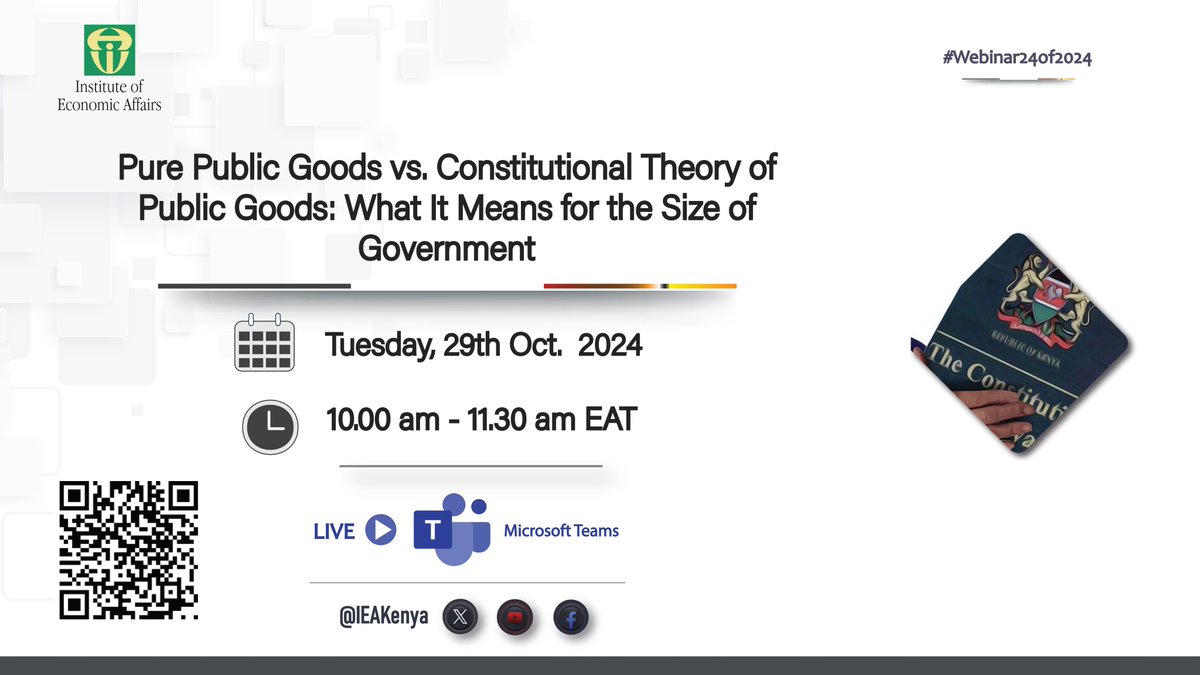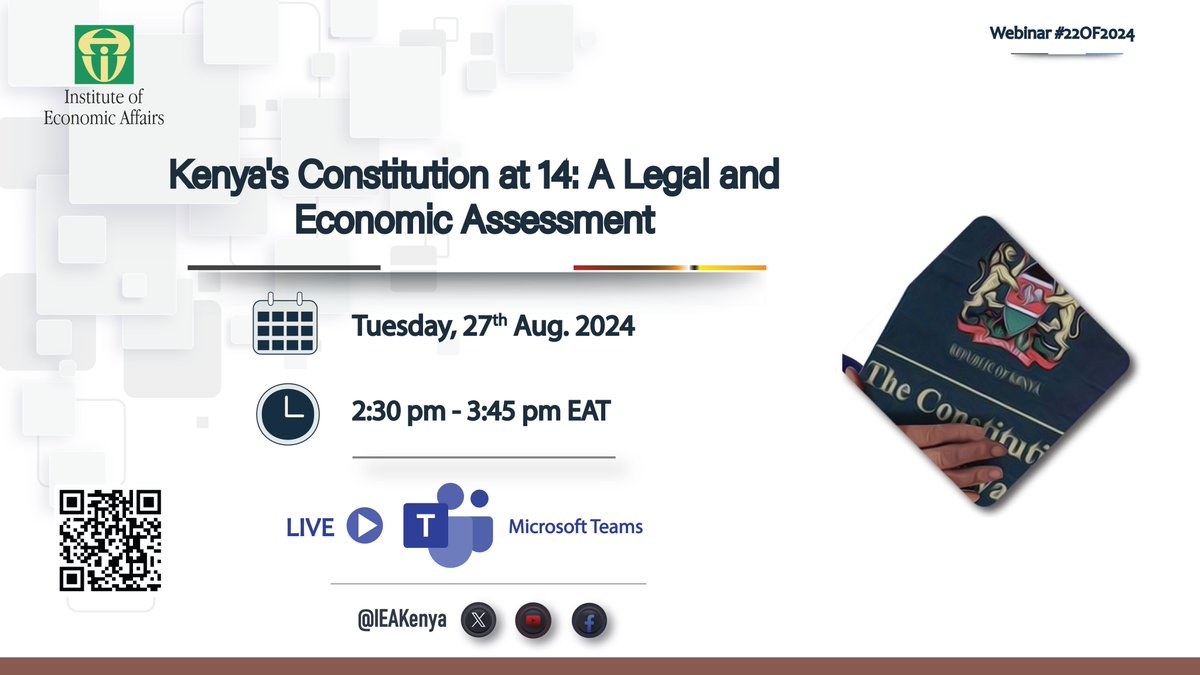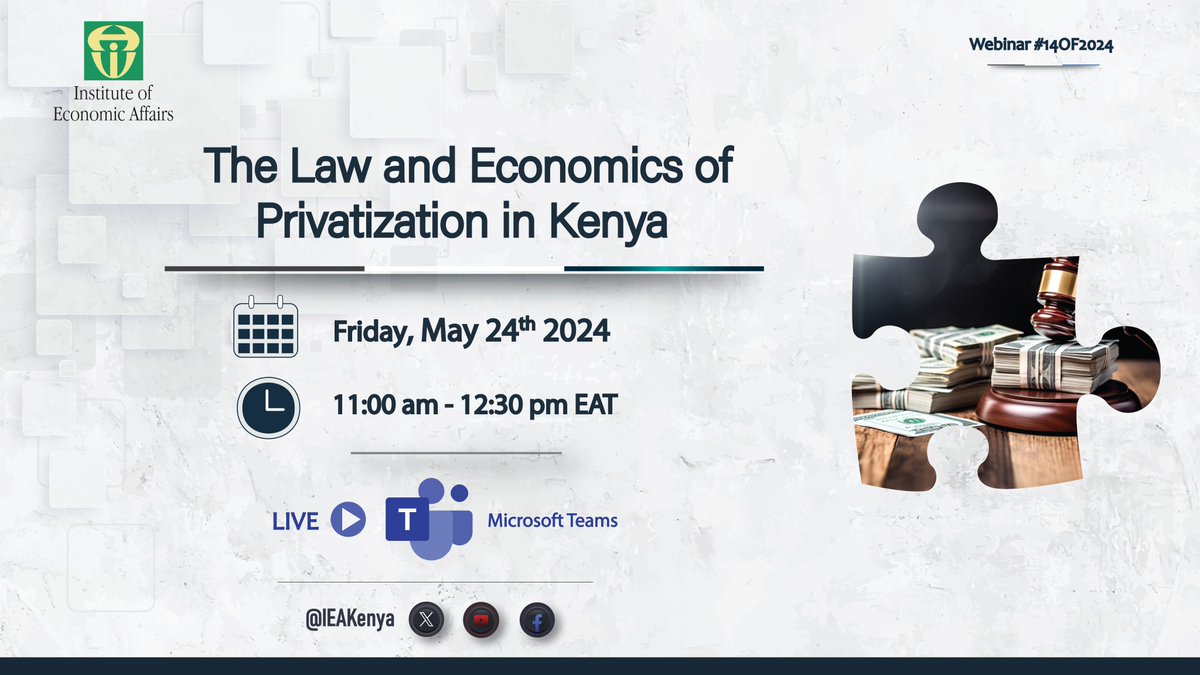Publications By Author : Leo Kipkogei Kemboi
47 Found
| Date | Details | Document |
|---|---|---|
Tue, Oct 29, 2024  |
Webinar #25/2024: Pure Public Goods vs. Constitutional Theory of Public Goods: What It Means for the Size of GovernmentAuthor(s) Kwame Owino, Leo Kipkogei Kemboi,Theme: Economic Literacy, |
File Size: 1.38 MB No of Downloads: 31. |
Fri, Sep 27, 2024  |
Media Breakfast Meeting on Public Sector Accountability and Kenya’s Public Procurement System: Insights from the Public Procurement Information Portal (PPIP)Author(s) Leo Kipkogei Kemboi,Theme: Accountability, |
File Size: 248.02 KB No of Downloads: 37. |
Fri, Sep 20, 2024  |
On Efficiency, Equity, and Optimal Taxation: Reforming Kenya’s Tax SystemAuthor(s) Leo Kipkogei Kemboi,Theme: Taxation, Kenya faces numerous challenges and complexities in formulating and implementing tax policies, undermining the effectiveness of the taxation system. These issues include structural inefficiencies like a narrow tax base, difficulties in taxing informal sectors, misalignment between the tax code and economic structure, over-reliance on key tax heads, and a complex political environment. Mandatory annual revisions through the Finance Bill introduce further obstacles due to insufficient evaluation of previous revisions and increased complexity for taxpayers/businesses. These challenges highlight the urgent need for a more strategic approach to tax policy in Kenya that balances responsiveness, economic analysis, evidence, and stability (Kemboi & Kagume, 2024).[1] An ideal tax system efficiently generates the necessary public revenue with minimal economic distortion, ensures equity by taxing individuals fairly according to their ability to pay, maintains simplicity for ease of tax understanding and administration, ensures transparency for accountability, offers neutrality to prevent market distortions, operates cost-effectively, adapts to change flexibly, provides stable expectations for planning purposes, and has a broad tax base to avoid overburdening any single group [1] Kemboi, L. K., & Kagume, J. (2024). Political Economy Analysis of Taxation Policy in Kenya-IEA Kenya. https://ieakenya.or.ke/?wpdmdl=3304 |
File Size: 1.27 MB No of Downloads: 199. |
Tue, Aug 27, 2024  |
Webinar #22/2024: Kenya’s Constitution at 12: A Legal and Economic AssessmentAuthor(s) Jackline Kagume, Leo Kipkogei Kemboi,Theme: Democracy, Economic Literacy, |
File Size: 182.51 KB No of Downloads: 118. |
Thu, Jul 4, 2024  |
Webinar #18/2024: Unpacking the Finance Bill, 2024 Dissent: Legal, Economic and Constitutional PerspectivesAuthor(s) Jackline Kagume, Leo Kipkogei Kemboi,Theme: Economic Literacy, Finance Bill, |
File Size: 1.08 MB No of Downloads: 244. |
Fri, May 24, 2024  |
Webinar 14/2024: The Law and Economics of Privatization in KenyaAuthor(s) Jackline Kagume, Leo Kipkogei Kemboi,Theme: Economic Literacy, |
File Size: 407.61 KB No of Downloads: 186. |
Fri, Mar 15, 2024  |
IEA Webinar #6/2024: Index of Economic Freedom: Observations & Policy Insights for the EAC RegionAuthor(s) Leo Kipkogei Kemboi,Theme: Economic Freedom, Economic Growth, This presentation was made by Leo Kipkogei Kemboi during a webinar on The Index of Economic Freedom: Observations and Insights for the EAC Region held on Thursday, 14th March 2024. |
File Size: 1.15 MB No of Downloads: 224. |
Mon, Mar 11, 2024  |
Political Economy Analysis of Taxation Policy in KenyaAuthor(s) Leo Kipkogei Kemboi,Theme: Taxation, Kenya’s tax policy formulation and implementation face challenges and complexities influenced by the country’s political ecosystem, structural and institutional factors, access and influence asymmetries, and the dynamic nature of tax laws and administration methods. However, it is unclear how much of the tax code is guided by conventional wisdom rather than solid empirical evidence and relevant economic literature. This lack of clarity raises concerns about the tax system’s transparency, effectiveness, and efficiency in supporting development goals. Furthermore, the development of new taxes and frequent changes in tax laws and policies do not always appear to be adequately informed by rising demands for infrastructure spending or the provision of rights, indicating the need to investigate the factors underlying these irregular and frequent changes in taxation. Furthermore, the formal and informal processes that shape tax policy changes require further investigation to understand the underlying dynamics and power structures at work. To identify the root causes of these policy problems and provide insights for designing more effective and equitable tax policies and administration methods, a comprehensive analysis of Kenya’s political economy, encompassing the structural and institutional factors involved and the type of evidence behind tax policy changes, is required. The Kenyan Tax Code is shaped by several political economy issues, the most important of which is the need to collect enough revenue to meet development goals. The development needs referred to here are always in the form of concrete things, key examples of which include buildings roads, and might not necessarily refer to public services. According to Scott (2022), a tax code is a set of laws and regulations that outline the general public’s rights and responsibilities regarding taxation.[1]The Kenyan Constitution, 2010 is the primary law in the Kenyan legal context, outlining principles of taxation, giving the powers to tax, and establishing the institutions that oversee each part of the taxation function. [1] Scott, Michelle P. “Tax Code Definition.” Investopedia, 2019. https://www.investopedia.com/terms/t/tax-code.asp. |
File Size: 1.47 MB No of Downloads: 886. |
Tue, Feb 27, 2024  |
IEA Kenya Webinar #03: The Political Economy of Taxation in KenyaAuthor(s) Leo Kipkogei Kemboi,Theme: Taxation, This presentation was made by Leo Kipkogei Kemboi during a webinar on The Political Economy of Taxation in Kenya held on Friday, 23rd February 2024. |
File Size: 519.27 KB No of Downloads: 257. |
